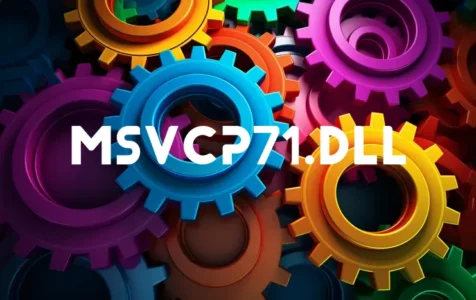MSVCP71.dll: An Essential Component for Windows Applications
If you’ve ever encountered an error message regarding the MSVCP71.dll file, you’re not alone. This file is a system component that plays a vital role in the smooth functioning of various applications on your Windows computer. Here’s everything you need to know about MSVCP71.dll, including what it is, its importance, safety concerns, common issues, and troubleshooting steps.
The MSVCP71.dll file belongs to the Microsoft C++ Runtime Library. It’s a Dynamic Link Library (DLL) file, which means it contains code and data used by multiple programs at the same time. Specifically, this library is utilized by programs compiled with Microsoft Visual C++ version 7.1, which dates to around 2003.
As a module that contains crucial instructions, MSVCP71.dll is essential for applications developed with certain versions of Microsoft’s development software to run correctly. It is common to see this DLL file used by older programs and games, as well as some software development tools.
Safety and Security
When it comes to DLL files like MSVCP71.dll, the primary concern is whether they are safe to run or if they could be a virus or malware. The genuine MSVCP71.dll file provided by Microsoft is completely safe. However, malicious programs sometimes masquerade as legitimate DLL files to escape detection. To ensure safety, you should never download this file from unverified sources.
Expert Tip: For smoother PC performance, consider using a PC optimization tool. It handles junk files, incorrect settings, and harmful apps. Make sure it's right for your system, and always check the EULA and Privacy Policy.
Special offer. About Outbyte, uninstall instructions, EULA, Privacy Policy.
Commonly, a version of MSVCP71.dll already exists on your system, especially if you have software that requires it. For example, some versions of Microsoft Office, Oracle client, or SQL Developer may include MSVCP71.dll.
Common Issues and Their Fixes
Errors related to MSVCP71.dll could pop up for various reasons, such as the deletion or misplacement of the file, corruption by malware, or a damaged Windows registry. Users may encounter error messages stating that “MSVCP71.dll is missing from your computer” or similar.
How to Address MSVCP71.dll Errors
Before attempting any solutions, it’s important to ensure that the error is not the result of a virus or malware. Scanning your system with a reliable antivirus tool should be your first step.
If the file is simply missing or deleted, here are some fixes you can try:
- Check for the File Locally: You might find another copy of MSVCP71.dll elsewhere on your system. Search for the file and, if found, copy it to the System32 directory for 32-bit systems or SysWOW64 for 64-bit systems. A common location for an existing copy is within Oracle installation folders.
- Reinstall the Associated Program: If MSVCP71.dll errors happen when running a specific program, reinstalling that software may restore the missing DLL file.
- Install Microsoft Visual C++ Redistributable: While MSVCP71.dll is not included in recent redistributable packages, installing the latest Microsoft Visual C++ Redistributable might resolve related issues for some programs.
- Microsoft .NET Framework 1.1: As MSVCP71.dll is sometimes tied to the .NET Framework 1.1, installing or reinstalling this framework could help fix the issue.
However, since MSVCP71.dll is an older runtime component, you might not find straightforward support or redistributable packages from Microsoft. In such cases, the solution might be program-specific and users are advised to check software documentation or contact support for the associated program.
Always remember to download files like MSVCP71.dll from reputable sources. If you’re unsure of how to identify your Windows version or need further assistance with these steps, you could find support in various tech forums or help communities.
While DLL files can seem perplexing and errors frustrating, the right approach to troubleshooting can help get your applications back up and running. If you continue to experience issues or are unsure about any steps, seeking help from a professional or the program’s support team is advisable.
